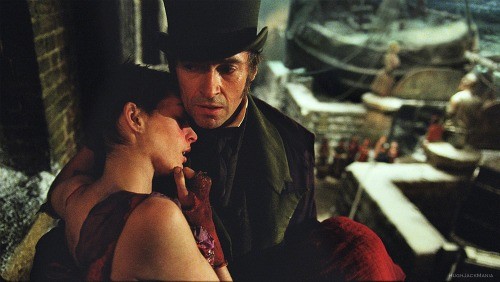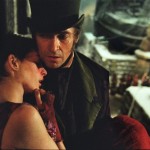From the page to the stage to the screen, it’s been quite the journey for Les Misérables. Once Victor Hugo’s novel, then Cameron Mackintosh’s stage musical, and now Tom Hooper’s movie, the beloved tale of lives in the gutters of 19th century France hits the big screen in musical form looking, well, almost identical to the stage version. Apparently this was one adaptation effort too many. And apparently Tom Hooper temporarily forgot that the sets and makeup were being designed for a camera and not for the back row of a stage theatre. It’s the only explanation for how garish and awful a visual experience this version of Les Misérables provides. Keeping the sung-through style of all singing all the time almost intact means that Hooper’s movie still sounds great, but it looks like a decrepit theme park gone laughably awry.
Since the music and the majority of the script are already done and such an adaptation as this needs to justify its stage-to-screen transformation, there’s no bigger or better space to find its own identity than in the visual language of the picture. So while being able to comfortably enjoy the melodious sounds of the famous tunes once more is still an enjoyable experience, it feels like such an automatically integrated pleasure that little credit can go to Hooper for anything other than the bold decision to record live vocals on set as opposed to having the actors dub their lip synched performances in post-production like most musical movies. That decision remains a fine call on Hooper’s part, as it gives the various performances the space to breathe on screen. But too bad Hooper’s camera just as quickly suffocates that space with cramped compositions that make the nearly three hour running time a stifling bore.
Using close-ups to capture emotion and action in the vast majority of the shots, Hooper completely discards any sensible or even abstractly communicable form of cinematic language and instead turns nearly every scene into an entirely hideous display of misconceived framing. Even an action as simple as a character entering a room becomes a confusing stumble marred additionally by odd editing choices. Actual action sequences involving scuffles between characters are even more disastrous, clumsily cobbling together images of movement into a sloppy blur.
Watching this all unfold over such a long period of screen time (and without the stage version’s apparently necessary intermission) is a chore under Hooper’s direction. Having enjoyed the stage version quite immensely both times I’ve seen it, I figure there’s a way to get this tale to the screen without losing nearly all of its magic along the way, but shoving the camera in every actor’s face is certainly not the way to accomplish such a feat. Letting the makeup team run rampant with ridiculous alterations that appear painfully shoddy when shot at such tight angles is another clear mistake that contributes to the overall ugliness of Les Misérables. Sure, some of the characters and situations call for some grimy prosthetics or gaudy colors, but Hooper’s team takes it too far, swapping effective subtlety for showy theatricality.
In the briefest of moments that Hooper pulls the camera away from an actor’s face, thus sparing us the sight of the low caliber makeup work for a moment, the screen is usually filled with some cheap CGI in a disconcerting attempt to cinematically depict the immensity of a situation that could not be fully executed on stage. When the movie opens and we first meet story hero Jean Valjean (Hugh Jackman), the grizzled prisoner is one of many men pulling a massive ship onto a dry dock with nothing but rope and pure strength. It’s a moment of spectacle captured in a manner that is unique to cinema, but the scene still suffers from hokey digital effects that denigrate the imagery. Other rare moments of the camera being pulled back suffer from blatant green screen work and lazy bird’s-eye view shots of Paris streets painted with pixels.
Occasionally, the strength of the music breaks through Hooper’s wall of bad camera work to actually strike a chord. The songs can still stir at times and never better than during Anne Hathaway’s passionate belting of the signature song “I Dreamed a Dream.” It’s a touching scene and perhaps the one time that Hooper’s otherwise vapid framing works in an actor’s favor. Pushing Hathaway’s Fantine into one corner of the screen, isolating her, and letting her be nearly swallowed up by the surrounding darkness is actually a visual touch that the emotional scene can use. But then the technique of pushing actors against the edge of a frame is eventually overused and Hooper’s lack of visual imagination leads to lamely recycled compositions.
It seems that beyond casting the movie (Russell Crowe, Amanda Seyfried also star) and opting for live vocals, Hooper can’t get anything else right. His penchant for capturing every longing look, every tear, every cry with his full frame only serves to further sentimentalize the experience and his love of Dutch angles is on full comical display here. The camera is tilted so often and with so little reason that I almost expected to see the actors start slipping on the sets. It’s all so silly and this inanity undercuts the drama. The songs still sound lovely, of course, but while this Les Misérables may be music to the ears, it’s also an achingly abysmal assault on the eyes.






'Movie Review: Les Misérables (2012)' have 15 comments
December 28, 2012 @ 3:02 pm Brainload
I can’t imagine watching a movie with all sung dialogue, especially when it is sung by untrained vocalists.
December 28, 2012 @ 3:19 pm Commander A8
It was the 19th century, Aaron. The world wasn’t exactly clean! I thought the costumes and cinematography were impeccably done.
December 28, 2012 @ 3:42 pm Dermis
I;ll never watch a musical again.
December 28, 2012 @ 4:20 pm Wantage Soup
Tough to explain, it was somehow very not right. It belongs on stage where a production like this can breathe and feed off of the audience.
December 28, 2012 @ 7:21 pm Mugget
The impact of the stage show didn’t translate over. But aside from there being one or two overly long slow sequences the movie is still a fine interpretation of the Victor Hugo story.
December 28, 2012 @ 4:34 pm Rick Olson
Holy hell. Even my friend who dragged me to this over the weekend thought 3 hours was an impossible amount of time for one sitting (plus it feels like it is 3x that.)
December 28, 2012 @ 5:13 pm Eyetooth
I can appreciate Les Mis for the sheer magnitude of trying to bring the play to the screen. I can’t appreciate the result though.
December 28, 2012 @ 5:48 pm Retrad
I am 100% confident I would have liked this if it were done without the signing dialogue.
December 28, 2012 @ 6:44 pm roguegoat
Hugh Jackman is a talented mofo. This guy can do it all.
December 29, 2012 @ 8:44 am Scannell
He is quite good on this. I can see him getting recognized for the effort. Hathaway too.
December 28, 2012 @ 9:02 pm General Disdain
Russell Crowe’s singing made me think of Pierce Brosnan’s in Mama Mia!. Neither of them can sing a lick but both make a sincere effort and sing their hearts out.
December 28, 2012 @ 9:30 pm EPark
Dreadful.
December 28, 2012 @ 11:27 pm Laslo
If it weren’t for the ‘signing dialogue’ how would the deaf in the audience enjoy the musical? I think you meant ‘singing.’ :)
December 29, 2012 @ 3:34 pm aj.snow
I liked it better than the Liam Neeson non-singing adaptation.
January 3, 2013 @ 11:55 am Tom Valance
How many good adaptations of classic literature are there, anyway? Even the best ones, like John Huston’s often-overlooked 1987 adaptation of Joyce’s short story ‘The Dead’ works best a a sort of companion piece to the film. The greatest literary adaptations, in my view, are based on less-prestigious and canonized, more recent novels, like a Clockwork Orange.